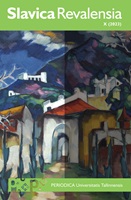«Мачеха российских городов»: Берлин 1920-х годов глазами русских писателей
“The Stepmother of Russian Cities” Revisited: Berlin of the 1920s through the Eyes of Russian Writers
Author(s): Alexander DolininSubject(s): Cultural history, Russian Literature, Pre-WW I & WW I (1900 -1919), Interwar Period (1920 - 1939), Theory of Literature, Sociology of Literature
Published by: Tallinna Ülikooli Kirjastus
Keywords: Gabriel Superfin at 80; 20th-Century Russian Literature; Vladimir Nabokov (1899—1977); Russian Berlin; History of Literature;
Summary/Abstract: The article examines images of Weimar Berlin in Russian literature of the 1920s. In contrast to the glamorization of Berlin as the center of modernity in art, technology, mass entertainment and sexual practices in the writings of German and West European authors of the period, most Russian writers echoed Spengler’s critique of Western civilization and portrayed the city in a negative light underlining its boredom, ugliness, and the lack of vitality. For them, Berlin was like a huge transfer station that they were eager to leave as soon as possible. A smaller group of Russian émigrés that stayed in Berlin for a long time tried to ignore the hostile outside world and absorb themselves in their Russian memories and cultural milieu. The only exception to these trends was the Berlin of Vladimir Nabokov, who managed to turn the foreign city into the main source and object of his Russian-language short stories and novels.
Journal: Slavica Revalensia
- Issue Year: 2023
- Issue No: 10
- Page Range: 359-404
- Page Count: 46
- Language: Russian

